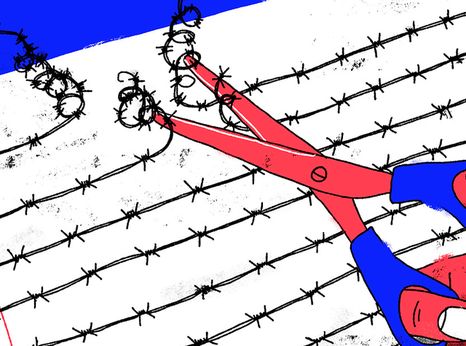Prisoner of conscience at risk of Covid-19

According to information available to Amnesty International, Roberto de Jesús Quiñones Haces, a lawyer an independent journalist at the news website Cubanet, was convicted and sentenced to one year in prison in August 2019 by the Municipal Court of Guantanamo for resistance and disobedience. He was arrested on 11 September 2019 and has been in prison ever since.
During his detention since September 2019, Roberto Quiñones Haces has been regularly reporting the prison conditions in which he is held. On March 31, he wrote in Cubanet that even though prison authorities had implemented certain measures regarding COVID-19, “the quality of the food is still deplorable. Despite reports of the vulnerability of older adults (prisoners over 60) to COVID-19, many of them are kept in cubicles where they live in overcrowded conditions with almost two dozen people.”
On March 5, he had already described the quality of food and water served in prison, as well as the medical attention available to prisoners. According to his family, he is allegedly held in a small cell with at least 17 other individuals, sharing beds and sanitary services in the same cell.
International human rights standards regarding the rights of persons deprived of liberty or in detention are particularly relevant considering a global health crisis as COVID-19. In general, all prisoners must be granted protection and access to healthcare in the face of COVID-19, without discrimination. People who have no choice but to be in close proximity to each other face particular risk for COVID-19, based on the information currently available.
In countries such as Cuba, activists, including political activists, and human rights defenders are regularly imprisoned solely for their consciously held beliefs. These people should not be in prison in the first place and should be immediately released. Therefore, our primary call under these circumstances is that Cuba should release all prisoners of conscience and those imprisoned solely for peacefully exercising their freedoms of expression and conscience. Roberto Quiñones Haces also has health affections that put him at increased risk, due to his age. Cuban authorities must release Roberto immediately and unconditionally, considering the risk that COVID-19 poses, besides his condition as a prisoner of conscience.
On 20 August, the Inter-American Commission on Human Rights’ Office of the Special Rapporteur condemned the prison sentence against journalist Roberto Quiñones and expressed concern about the persistence of criminalization and harassment against communicators and human rights defenders in Cuba. The Office of the Special Rapporteur in a recent report on Cuba, found that state agents are the “main source of threats and attacks against the press” and called on this practice to be “dismantled and sanctioned.”
Amnesty International has found that the disproportionate and arbitrary use of the criminal law, and campaigns of state-sponsored discrimination against those who dare to speak out, coupled with discriminatory dismissals from state-employment, and the lack of an independent judiciary to challenge this, has created a profound climate of fear in Cuba.
Cuba remains the only country in the Americas which Amnesty International is not permitted to enter for human rights monitoring work.